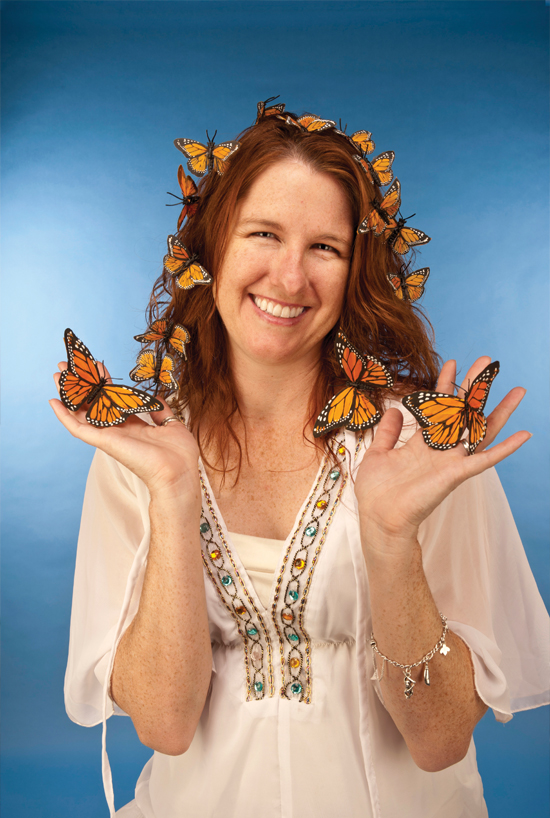
When it rained at Terri Matiella's childhood home in San Angelo, Texas, the self-proclaimed tomboy would run outside and collect bullfrogs in her favorite pink Crayon-shaped cup. She smuggled them into the house as her pets.
“I always liked being outside as a kid,” she said. “When we were little, my sisters and friends and I would play with leaves and pretend to grind them up because we were making wheat and bread.”
But even then, there was just something special about butterflies. They held a certain magic for her.
“They are just fun,” she said. “You can’t feel sad when you’re looking at butterflies.”
So Matiella decided to make monarch butterflies the subject of her doctoral research. Aided by an Alumni Association scholarship that allows her to focus entirely on her research without having to juggle a full-time job, Matiella is working to find out if varying levels of carbon dioxide and ozone on monarch caterpillars’ sole food source, milkweed plants, has any effect on the development of butterflies. She’s also studying how those gases affect the plant’s growth.
“There’s a whole chain reaction that can happen from this one component of climate change,” she said.
Any variation in the milkweed plants could cause them to be less nutritious to caterpillars. That could mean the caterpillars have to eat more to gain the same nutritional value, which keeps them exposed to predators longer as they feed on the plant’s leaves. Milkweed also contains toxins that stick with the caterpillars through metamorphosis into butterflies. These toxins make them poisonous to birds. But it’s possible the gases could weaken the toxins and make the butterflies vulnerable to predators.
It’s this kind of chain reaction that makes Matiella so interested in environmental science. In 2000, she received her bachelor’s degree from UTSA in biology. She returned to UTSA to pursue her master’s in environmental science and graduated in May 2009. That fall, she enrolled in the Ph.D. program.
“I enjoy ecology and looking at how organisms interact in the environment,” she said. “There is so much we don’t know about what is happening with the world today with climate change and how it affects things even on a small plant or insect scale and how that transfers up and affects us.”
She began teaching at the college level in 2007. First she was a graduate assistant in an ecology lab, but has worked her way up to leading a 126-student lecture class.
Matiella’s students learn about biomes of the world, precipitation and weather patterns, plant adaptations and the chain reactions in nature that have always fascinated her.
“It’s like a big puzzle and everybody has a little piece of it,” she said. “I think this generation is going to have to come up with answers, solutions to the problems we have today. They didn’t create them, but they’re there and [the students] are the ones that are going to be faced with them.”
Anne Englert, director of alumni programs, said Matiella’s love of nature and the desire to share her knowledge is inspiring.
“She’s extremely driven,” Englert said. “She lives what she says. She’s a mother of two, and she takes her children to the zoo and shows them nature. She’s living what she’s studying. That’s a perfect mix.”
Matiella expects to finish her doctoral program in December 2012, but ultimately, it’s up to nature to set the timetable. Already her research has been delayed because of drought and a little bit of bad luck that has killed her ninth attempt at growing milkweed plants.
“You kind of have to roll with the punches,” she said. “Working with the environment is such a big thing. There are so many unknowns that you can’t predict. You have to be patient, you have to be resilient. And you have to really like what you’re doing because you’re stuck with it for a long time.”
And that’s why she chose butterflies.
—Lety Laurel